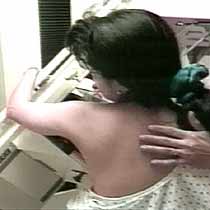This is the VOA Special English Health Report.
On Monday, an influential group of medical experts released new guidelines on testing for breast cancer. The guidelines are from the United States Preventive Services Task Force. Its members are appointed by the government but its recommendations are independent.

The new guidelines appear in the Annals of Internal Medicine.
One of the biggest changes is that the task force now advises against mammograms for most women under 50 years old. In 2002 the group had suggested such screening tests every one to two years for women 40 and older.
The new guidelines also say women between 50 and 74 should not get mammograms every year as currently advised. The experts now recommend testing every two years for that age group.
The task force says the new recommendations are not meant for women who have an increased risk of breast cancer.
The experts also say there is not enough evidence to decide about the benefits and harms of testing women 75 or older.
But the group recommends against teaching women breast self-examination. It says evidence suggests that doing so does not reduce breast cancer deaths.
Mistaken test results -- called false positives -- are one problem. But another problem noted by the task force is overdiagnosis. This is when doctors find and possibly treat cancers that would not have shortened a woman's life.
Radiation exposure from breast X-rays is another consideration, though the task force says it may be a minor concern.
The task force did not suggest one form of mammography over another. It says there is not enough evidence to decide about either digital mammography or magnetic resonance imaging instead of traditional film mammography.
Some doctors say the new guidelines will reduce women's chances of needless treatments, invasive tests and harm, including psychological harm. But other doctors say they worry that the changes will reduce testing and lead to more women dying from breast cancer.
The American Cancer Society says it will continue to advise women 40 and older to have yearly mammograms. But breast cancer expert Susan Love says the new guidelines are similar to those of most other countries.
And that's the VOA Special English Health Report, written by Caty Weaver. For more health news, go to voaspecialenglish.com. I'm Steve Ember.
mammogram: an x-ray image of the human breast, used to detect tumors or other abnormalities 乳房X光攝影片
Related stories:
Water Cube turns pink to raise breast cancer awareness
Cancer may soon be world's leading killer
健康:有乳腺癌家族史女性更易患病
研究:卷心菜可防癌
英國(guó)發(fā)明能檢測(cè)乳癌的“智能胸罩”
(Source: VOA 英語(yǔ)點(diǎn)津編輯)